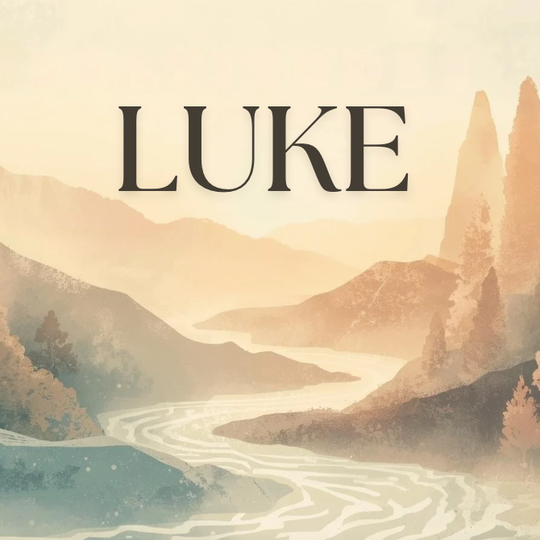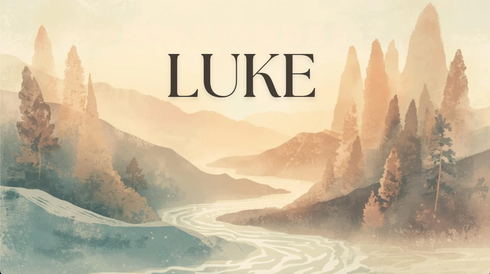
Luke 23: Our King Reigns
Luke 23 stands like a mountain ridge in the story of Scripture, and climbing it reveals the hard edges of history and the soft center of grace. The chapter moves with stark clarity: the trial before Pilate, the detour to Herod, the crowd’s demand for Barabbas, the weary road to Golgotha, the cruel mechanics of crucifixion, the thief’s last-minute faith, the earth’s shudder at noon, the tearing of the temple veil, and the quiet resolve of Joseph of Arimathea as he lays Jesus in a new tomb. Each scene is more than history; it is theology embodied. Power faces innocence. Prophecy steps out of shadow into daylight. Justice is bent by politics, and then God bends history back with mercy. Reading slowly, you notice how Luke the physician records wounds and witness, and how Luke the investigator arranges testimony so that the innocence of Jesus is declared by enemies and strangers alike. The centurion’s verdict, Pilate’s repeated “no fault,” and the criminal’s clear-eyed confession form a chorus: the righteous suffers for the unrighteous, and that suffering changes everything for everyone who looks and believes.
We begin with the machinery of empire and religion grinding together. Pilate wants quiet streets more than a clean conscience. Herod wants a show more than the truth. The leaders want Jesus gone more than they want justice done. Yet their words and choices push forward an older script: the Servant is despised, the Passover stands near, and two paths are set before the people. Luke leaves us with a sobering symmetry: Barabbas, the insurgent, walks free, while Jesus, the innocent, is condemned. The exchange is not an accident of politics; it is a signpost. The ritual of Leviticus lingers in the background—the scapegoat sent away, the sacrificial goat slain for the sins of the people. Names and meanings echo across the square, and whether or not the crowd perceives it, substitution sits at the center. One life goes free. One life is given. The gospel draws a straight line through that moment and into every heart that knows it deserves judgment and longs for mercy. Pilate washes his hands; God does not. He places them on the cross.
On the road, strength fails. Roman flogging has already taken its price; the crossbeam crushes down. Simon of Cyrene is pressed into the story and becomes a witness none of us can unsee: discipleship sometimes begins when the wood lands on your shoulder and you have no time to say no. Jesus turns to the weeping women and speaks of days that would scorch Jerusalem in 70 AD, a forecast of hunger, fear, and stone thrown against stone. Even there, in pain, he warns, teaches, and redirects tears toward the judgment to come. The detail matters because it shows the Lord’s heart under the world’s weight; he sees beyond nails and taunts. He is not only the Lamb going to slaughter, but the Prophet who reads the times. He carries sin as he carries history, and he addresses both with the same steady courage. The green wood is being burned; what will the dry wood endure? The question is not only for them. It is for us who think we stand while the coals gather near our feet.
At Golgotha the language grows physical. Nails pierce not palms but the strong place near the wrist so that bones bear the strain of every gasp. Feet are pinned to give just enough leverage for breath to be won and lost again. Crucifixion is designed not only to kill but to display, to turn a human body into a warning sign along the Roman road. Soldiers gamble for garments; leaders craft their sarcasm into theology—“He saved others; let him save himself.” They place a sign above his head as if to define him with mockery, but the world reads a truer sentence than they intend. “King of the Jews” names both the charge and the promise. One criminal joins the chorus with a bitter dare; the other finds clarity at the edge of life and asks only to be remembered. Jesus answers with the most immediate future anyone ever heard: today. Not someday, not after penance, but today you will be with me in paradise. A thief sees a king on a cross and calls him Lord. That is the gospel in a single breath.
Creation adjusts its voice at noon. Darkness rolls over the land as if the sky refuses to watch. In the temple, unseen by the crowd outside the gates, the veil that once stood like a guarded horizon tears from top to bottom. The symbolism is bone-deep. For centuries, a thick curtain has declared both holiness and distance: God is near, but not accessible; present, but not approachable without blood and fear. Now the blood has come, and the fear has been faced. The way into the Holy Place opens, not by a human hand pulling a cord, but by the act of God. Access is no longer seasonal, tribal, or hierarchical. It is personal and purchased. The centurion feels the tremor in his soul and says what the court would not: surely this man was innocent. The crowd, so loud a moment before, goes home struck silent.
Let’s read it together.
#biblebreakdown
Get this text to you daily by texting "rlcBible" to 94000.
The More we Dig, The More We Find.




